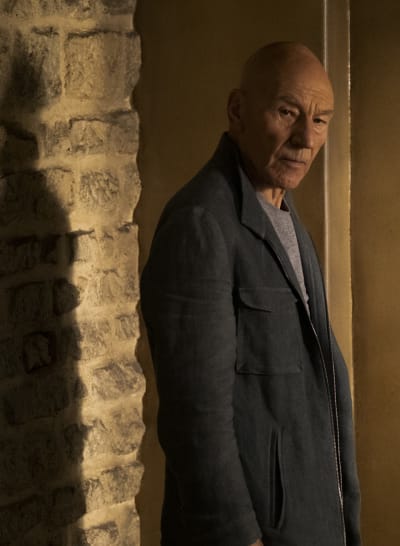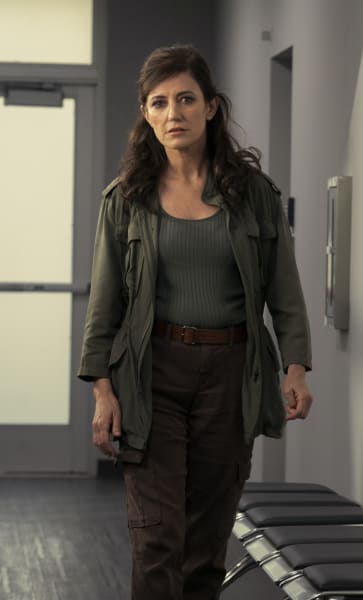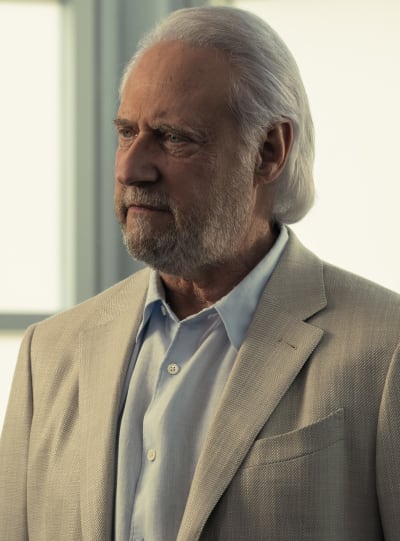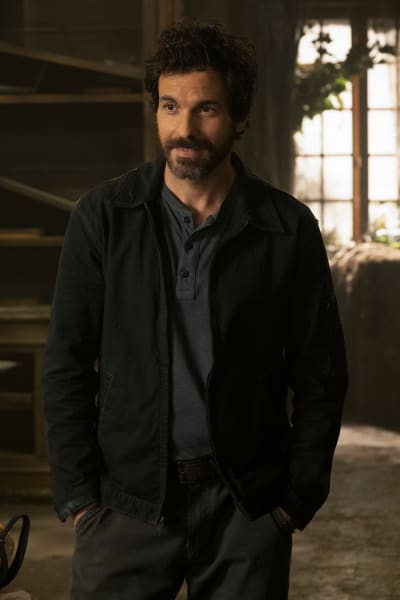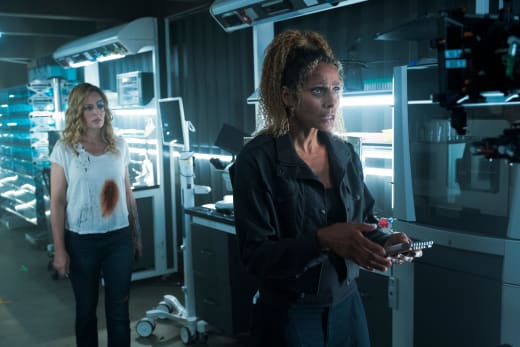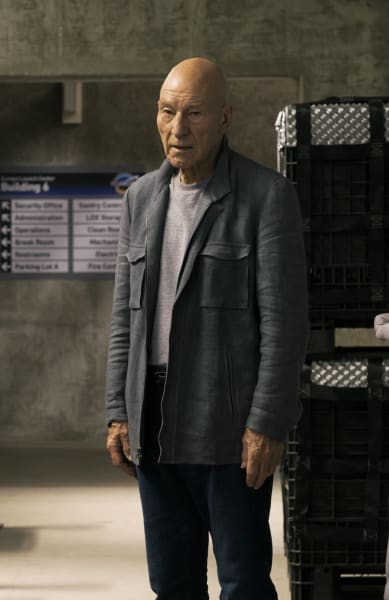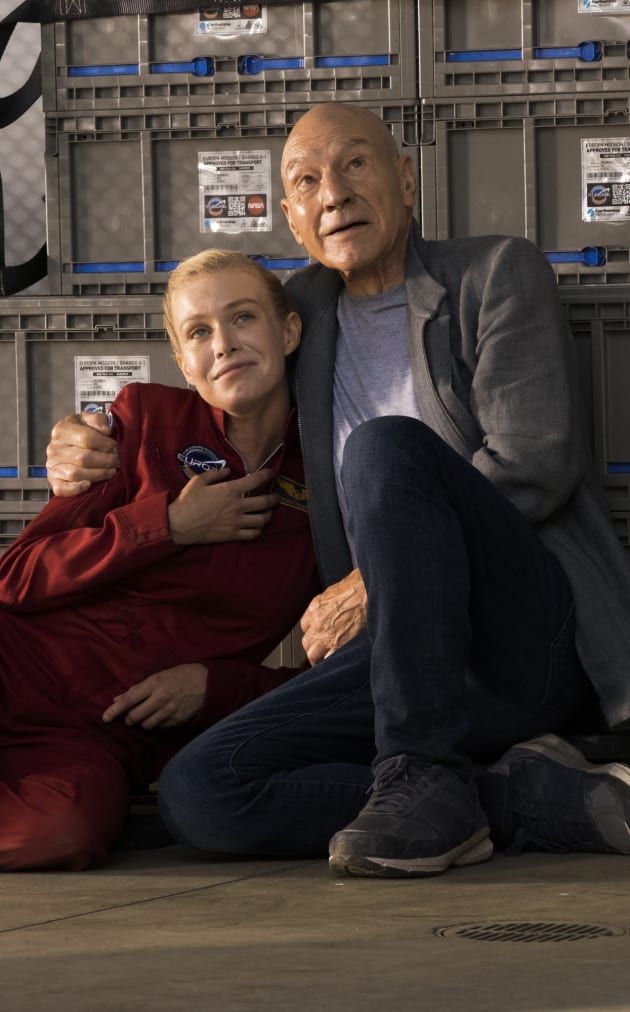
In terms of finales, Star Trek: Picard Season 2 Episode 10 answers all our questions, ties up the loose ends, and manages to surprise us with one last bit of Star Trek: The Next Generation fan service. I just wish it was more fun to watch.
The drawback of introducing so many story elements into one season is that wrapping it up ends up feeling more like checking points off a to-do list, and the elegance of the narrative gets lost in the mechanics.
So, while I celebrate Picard’s emotional healing and Seven’s acceptance of herself — and I’ll even raise a glass to Rios and his time hobo romance, — Jurati’s Borg evolution, Soong’s tie-in to Khan, and Kore’s recruitment to the Travelers just bursts the seams of seemliness.
I’m not usually one for clock-watching, but on my rewatch, I found myself tracking where the script’s “acts” broke up out of curiosity.
And it’s a very neat and tidy series of arcs, to be fair.
Act One follows directly on the departure of Jurati/Borg queen with La Sirena and addresses the issue of the Europa launch and Soong’s last-ditch attempt to secure his legacy by stopping Renée Picard from making her extraterrestrial discovery.
Picard: I won’t let you sacrifice yourself!
Tallinn: You won’t let me? It’s not up to you. This is my life. You don’t get to stop me from fulfilling my purpose because you’re scared I’m gonna die. My fate is not yours to decide.
It simultaneously concludes Tallinn’s arc as a Watcher and drives home Picard’s lesson that it’s not his job to save everyone.
I understand. I’ve seen the heart of this in you, but other people’s lives aren’t up to you. And their deaths aren’t your fault. Not mine if it comes. Not your mother’s. That’s a fantasy, Jean-Luc. Can’t control who we lose, and we can’t spare ourselves the pain of it. Other people’s choices are their own to make, and this one is mine. I don’t need saving. I never have.
Tallinn
Tallinn’s role in this adventure has been manifold. She’s been a facilitator and accomplice, guide and mirror. In sacrificing herself for Renée’s success, she is the beacon of meaning for the rest of the team, fulfilling her singular purpose by giving up everything but also getting everything in return.
For those playing along, she dies at the nineteen-minute mark.
The second act is where the laundry list of plot closures becomes apparent, and it’s unfortunate because it splits a lot of the focus that rightfully belonged to Q.
Picard: From the very beginning, for over thirty years, why me?
Q: I am moving on. In your parlance, I am dying.
Picard: Yes, I know.
Q: Alone. I am dying alone. I do not want that for you.
I am glad Kore gets the final word in her conflict with Soong. And the fact her act of vengeance propels him towards Project Khan is pretty darned clever.
(Mind you, what scientist doesn’t back up his work? Soong’s arrogance might supersede the need for redundancies, but that’s on him.)
Wil Wheaton’s appearance as Wesley/The Traveler is probably my favorite bit of fan service in this very service-y season.
Since the time of Wesley, Wheaton has become a personality in his own right as a writer, a host, and a very engaging moderator for discussions on all things Trek.
So seeing him reprise his role IN Trek is very meta.
Wesley: A long time ago, I was known as Wesley Crusher, but now, I am a traveler of all of space and time.
Kore: You’re kidding, right?
Wesley: The last time I told a joke, I inadvertently changed a century’s worth of history, so I work really hard to not be misunderstood.
Kore: That’s a lot.
Wesley: You have no idea.
Even more amusing is how his description of the universe can be applied to the Trek canon so many critics seem intent on pulling apart this season.
The universe is, essentially, a grand tapestry. It is flawless. It is fragile. It is exquisite. Yet it is somehow always a thread’s pull away from total annihilation. A star is born, but a ship is lost. A new species thrives, but a civilization collapses. Knowing when to step in, that’s the tricky part.
Wesley
While I’m here, kudos to everyone involved for keeping his appearance successfully under wraps, weathering the storm of “Whys” and “WTHs” after the Star Trek: Picard Season 3 casting news.
Act Two also pulls the curtain on our good Captain Rios.
Throughout the season, I’ve had issues with his infatuation with the 21st century and initially chalked it up to the head injury he sustained when Jurati transported him straight into a three-story fall onto the pavement on Star Trek: Picard Season 2 Episode 3.
However, the heart wants what the heart wants, and Dr. Theresa Ramirez is very much heart-worthy (even if she has a weird way of approaching romantic roleplay).
I never fit, y’know? Nothing stuck. I mean, I was living alone on a cargo ship with five holographic versions of myself. Not very encouraging.
Rios
I feel a little cheated by Rios’s departure. It also opens the door to many questions about what effect his knowledge of the future had on how history played out.
In the end, the middle act (running almost precisely twenty minutes, btw) showcased John de Lancie’s Q at his most vulnerable and — dare I say it? — human.
The condition must be contagious. The affection with which he provides an epilogue for Picard’s adventure is so novelly intense and honest, it’s like Q’s already moved on, and we’ve been left with his unfinished emotion as a specter of his former self.
You ask me why it matters. It matters to me. You matter to me. Even gods have favorites, Jean-Luc, and you’ve always been one of mine.
Q
Ask me sometime about my theory that Star Trek: Picard Season 2 is loosely based on The Wizard of Oz.
Needless to say, Q plays the Wizard, but he also serves as Glinda.
One massive question remains to be answered: What kills a Q?
I mean, besides a very pissed-off Raffi.
Q: Well, hello. Nice to see you all.
Raffi: Q, motherf–
Seven: Try not to kill him until we find out what he wants.
Raffi: ‘Try’ is right.
Given my druthers, the season would’ve had one more episode. Q’s final snap would’ve made a genuinely satisfying cut to credits here.
It would’ve given proper respect to de Lancie’s last scene. Q’s acceptance that he wanted his final act to be meaningful.
Q: Farewell, mon capitan. It’s time for me to go.
Picard: But not alone. Isn’t that the point of all this?
Q: See you out there.
It would’ve also allowed for another 40-60 minutes in which Picard and Captain Seven could unpack all the masked Borg queen minutiae.
Because, as Kore said, that’s a lot.
Elnor’s alive. Seven’s the captain. Rios is gone. Jurati’s a Borg queen. Raffi gets snapped back to the Stargazer instead of the Excelsior. What’s with that?
Furthermore, the whole distress call from Star Trek: Picard Season 2 Episode 1 — drawing out Picard and the entire fleet — is to save the quadrant from a galactic event? And provide the Better Borg with a place in the Federation?
Seven: Agnes, be brilliant.
Agnes/Borg queen: Always
It’s a convoluted but intriguing plot development that deserved its own space.
Instead, it’s mashed in with Guinan’s exposition of Rios and Ramirez and Picard’s reunion with Laris.
Finales are unique things. The weight of expectation built by the season rests on its shoulders to bring it home with style and substance.
I’m not one for nit-picking the details. I appreciate the dedication the writers poured into the season as an entertaining and exciting homage to many classic moments and characters.
I recognize making this show during the pandemic forced concessions to time and detail.
However, I can’t help but wish that the various conclusions could have been incorporated better into a cohesive send-off to what was a solid season.
What are your thoughts, Fanatics?
Did you find delight in this last offering? Did it leave you transported? Or just feeling stunned?
What are you looking forward to for Season 3?
Engage your comments and beam them down below!
Diana Keng is a staff writer for TV Fanatic. Follow her on Twitter.



